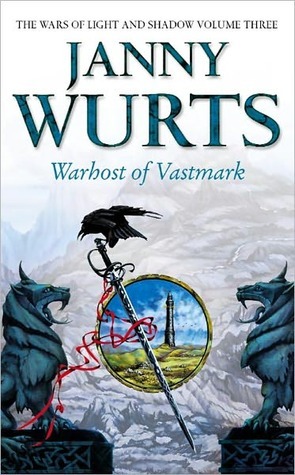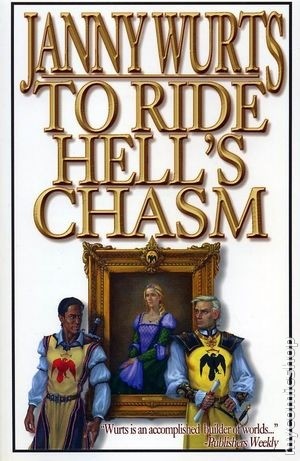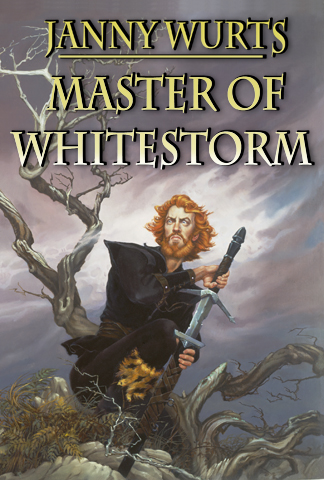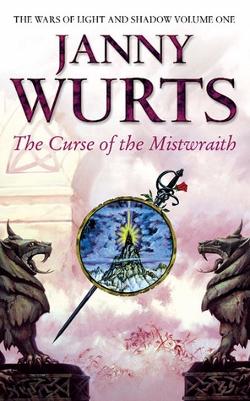For this installment of Under The Radar—the biweekly column where we highlight books that have unjustly gone unnoticed—I’m going to stretch our definition a bit by highlighting Janny Wurts, an author who has been, well, definitely not unnoticed, but at least underappreciated by readers and critics alike.
Yes, Wurts has published well over a dozen novels with major publishers over the course of her three decade career, but still, somehow her name rarely comes up whenever someone asks for epic fantasy recommendations.
Since I happen to believe that, once it’s completed, her Wars of Light and Shadow series will be counted among the great enduring classics of epic fantasy, I thought I’d take this opportunity to spread the word a bit.
Part of the problem is probably that, whenever the name Janny Wurts is mentioned in discussions about epic fantasy, the first thing people invariably bring up is the Empire Trilogy, which she co-wrote with Raymond E. Feist as part of Feist’s bestselling and ongoing Riftwar Cycle. All fine and good, but first of all, Wurts has written so much more. Secondly, you’d be surprised at how often her role in the creation of these books is miscategorized, or, thirdly, how often her name isn’t even acknowledged when the books are listed or discussed. At the time I’m writing this, just the first book in the Empire trilogy has over 13,000 ratings on GoodReads alone, more than the nine books that have been published in the Wars of Light and Shadows to date combined.
Janny Wurts has written so much more than those three books that happened to be co-written with a best-selling male author who probably has had more marketing dollars devoted to his works than all but a few female authors working in the genre. Don’t worry, I’m not going to start going on about gender disparity and voices being silenced and so on again (but believe me, this is a textbook case.)
One more data point: doing a quick search here at Tor.com, I could find only five articles that even mentioned Wurts, three in connection with Feist, and the two others were brief references by me. So. Let’s remedy this and talk about some of Janny Wurts other books, shall we?
First and foremost, there’s the Wars of Light and Shadow series, which currently stands at nine novels. Two more novels are in the works and will finish out the series. This is Epic Fantasy with capital E and capital F: the millennia-spanning tale of Paravia, a fantasy universe that, in terms of complexity and scope, rivals almost anything else in the genre, and the tale of Arithon and Lysaer, the two half-brothers whose struggles are tied to the fate of that world.
One of the most remarkable things about this series is that it doesn’t sprawl—it deepens. It doesn’t keep adding plot threads and characters. Instead, it continually adds layers of meaning and complexity to everything, from the history of the world to the background of the major players and factions. Wurts moves the markers from book to book, challenging the reader to reconsider previous assumptions at every turn.
 This also makes it an insanely difficult set of books to discuss or review. It’s hard to describe exactly why e.g. Warhost of Vastmark, the third book in the series completely blew me away, not because I’m worried about giving away plot details but because part of the joy of reading this series lies in regularly recalibrating your understanding of its mysteries. (I still consider it something of a personal triumph that, over the years, I managed to write individual reviews for each of the nine books in this series without major spoilers and without repeating myself too much. Achievement unlocked!)
This also makes it an insanely difficult set of books to discuss or review. It’s hard to describe exactly why e.g. Warhost of Vastmark, the third book in the series completely blew me away, not because I’m worried about giving away plot details but because part of the joy of reading this series lies in regularly recalibrating your understanding of its mysteries. (I still consider it something of a personal triumph that, over the years, I managed to write individual reviews for each of the nine books in this series without major spoilers and without repeating myself too much. Achievement unlocked!)
It’s impossible to encapsulate what makes this series so wonderful in a few paragraphs. It needs a post, or even better series of posts, all by itself. (It would actually make a great subject for a Tor.com reread, once it’s completed.) The books feature several completely unique modes of magic, all described in language that’s lyrical and precise and quite unlike anything I’d encountered in fantasy before. It covers a fantasy history that spans ages and planets. It features, to get specific about just a few favorite scenes, the single best description of a siege I’ve read in all of fantasy, as well as the single most hair-raising scene of dark magic. Once you’ve read these two scenes, similar ones in other fantasies feel like pale comparisons.
Part of the reason for this is the author’s remarkable prose. Janny Wurts writes in an instantly recognizable and, to be fair, somewhat challenging style—challenging because she uses an unusually broad vocabulary and complex, long sentences and paragraphs to explore every single nuance of meaning. It’s incredible dense prose, something to read slowly, to consider and re-consider carefully. I always have to adjust to Wurts’ style when I pick up one of her books: if your average reading speed is (to pick a random number) one page per minute, expect to spend several minutes per page here. Every word counts. Wurts will spend paragraphs, pages even, exploring one character’s changed perspective on an event, in a way that never feels spun out or repetitive but instead carefully explores every thought.
 Another great example of this style is To Ride Hell’s Chasm, which is one of my single favorite standalone fantasy novels ever. Princess Anja of the tiny kingdom of Sessalie has gone missing on the eve of her betrothal. The foreign-born former mercenary Mykkael, one of the genre’s unforgettable characters, tries to find her. The novel covers only about five days in the course of its 650 or so pages, but it somehow never feels long-winded because every emotion, every visual detail, every nuance of meaning is hammered down in the richest, most meticulous prose you could hope to find in the genre.
Another great example of this style is To Ride Hell’s Chasm, which is one of my single favorite standalone fantasy novels ever. Princess Anja of the tiny kingdom of Sessalie has gone missing on the eve of her betrothal. The foreign-born former mercenary Mykkael, one of the genre’s unforgettable characters, tries to find her. The novel covers only about five days in the course of its 650 or so pages, but it somehow never feels long-winded because every emotion, every visual detail, every nuance of meaning is hammered down in the richest, most meticulous prose you could hope to find in the genre.
To Ride Hell’s Chasm also is a nice example of another recognizable Janny Wurts hallmark: many of her novels feature something like a false resolution at the halfway point. You’ve got about half of the novel to go, and suddenly it feels like everything is coming together. The tension builds to a climactic peak, but instead of letting up, the author maintains and even raises the suspense until the actual end of the novel. The second half of this book is impossible to put down.
(Interestingly, by the way, Wurts uses the same trick in the Wars of Light and Shadow on multiple levels. This is planned to be an eleven book series, spread over five “arcs”: Arc One is one book, Arc Two is two books, Arc Three is five books, Arc Four is two books again and the final Arc is a single novel. One-two-five-two-one, a neatly symmetrical structure, with each book and each arc somehow having its own midway climax. It’s an impressive edifice, and for good reason considered the author’s opus magnum. It’s a crying shame that through the vagaries of the publishing world some of these books were hard to find in the US for a long time, but at least they’re all available in paperback again now.)
 And there’s so much more to goodness to be found in the author’s bibliography. Another personal favorite is Master of Whitestorm, the tale of a former galley slave who becomes somewhat obsessed (to put it mildly) with gathering enough money to build an impregnable fortress. Initially feeling like an old-fashioned episodic adventure fantasy, the novel gradually reveals an underlying thread that explains the main character’s personality. Think Lethal Weapon in a complex fantasy setting. Master of Whitestorm was just recently re-released as an ebook after being out of print for many years.
And there’s so much more to goodness to be found in the author’s bibliography. Another personal favorite is Master of Whitestorm, the tale of a former galley slave who becomes somewhat obsessed (to put it mildly) with gathering enough money to build an impregnable fortress. Initially feeling like an old-fashioned episodic adventure fantasy, the novel gradually reveals an underlying thread that explains the main character’s personality. Think Lethal Weapon in a complex fantasy setting. Master of Whitestorm was just recently re-released as an ebook after being out of print for many years.
I haven’t even covered Wurts’ full biography: there’s also the Cycle of Fire trilogy and her debut standalone Sorcerer’s Legacy (all written before Feist invited her to co-write the Empire books, by the way), and a major short story collection called That Way Lies Camelot. (Also, for the fans, there are some new Wars of Light and Shadow stories available on the author’s site.) I haven’t even talked about the fact that Wurts is also an accomplished artist who paints her own covers, and a talented musician.
I hope you’ll pardon my enthusiasm about all of this, but again, this author is so often ignored or miscategorized that it’s become something of a personal mission for me to spread the word. Still, if you won’t take my word for it, listen to Stephen R. Donaldson, who once famously said about Janny Wurts that it “ought to be illegal for one person to have so much talent.”
Stefan Raets reads and reviews science fiction and fantasy whenever he isn’t distracted by less important things like eating and sleeping. You can find him on Twitter, and his website is Far Beyond Reality.










